(完整版)新译林版七年级上册英语全册知识点归纳总结
- 格式:doc
- 大小:49.61 KB
- 文档页数:15
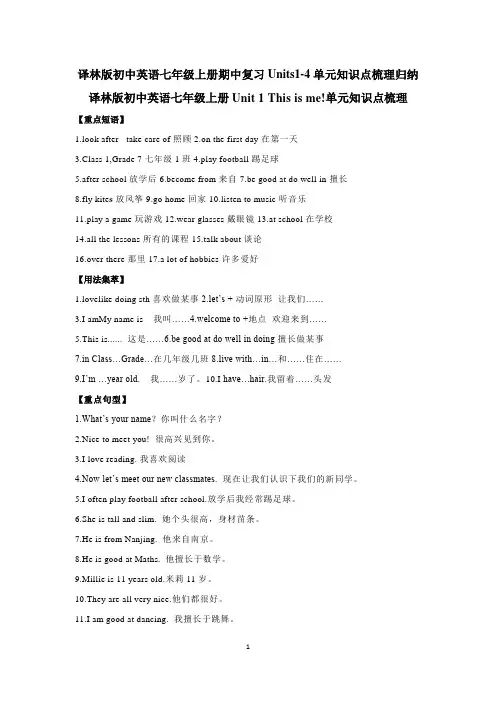
译林版初中英语七年级上册期中复习Units1-4单元知识点梳理归纳译林版初中英语七年级上册Unit 1 This is me!单元知识点梳理【重点短语】1.look after take care of 照顾2.on the first day 在第一天3.Class 1,Grade 7 七年级1班4.play football 踢足球5.after school 放学后6.become from 来自7.be good at do well in 擅长8.fly kite s 放风筝9.go home 回家10.listen to music 听音乐11.play a game 玩游戏12.wear glasses 戴眼镜13.at school 在学校14.all the lessons 所有的课程15.talk about 谈论16.over there 那里17.a lot of hobbies 许多爱好【用法集萃】1.lovelike doing sth 喜欢做某事2.let’s +动词原形让我们……3.I amMy name is 我叫……4.welcome to +地点欢迎来到……5.This is...... 这是……6.be good at do well in doing擅长做某事7.in Class…Grade…在几年级几班8.live with…in…和……住在……9.I’m …year old. 我……岁了。
10.I have…hair.我留着……头发【重点句型】1.What’s your name?你叫什么名字?2.Nice to meet you! 很高兴见到你。
3.I love reading. 我喜欢阅读4.Now let’s meet our new classmates. 现在让我们认识下我们的新同学。
5.I often play football after school.放学后我经常踢足球。
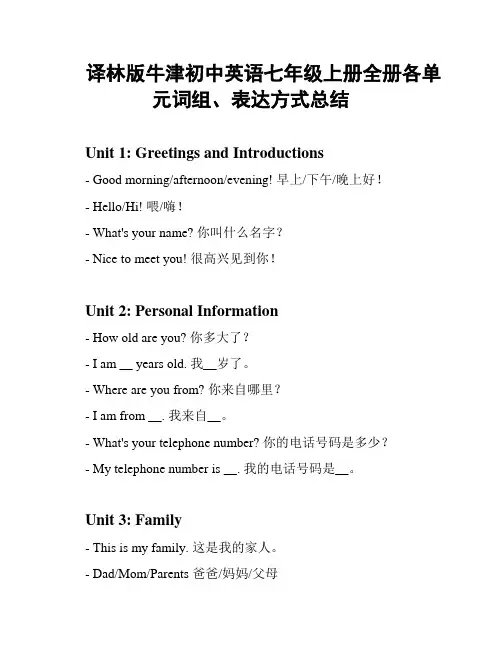
译林版牛津初中英语七年级上册全册各单元词组、表达方式总结Unit 1: Greetings and Introductions- Good morning/afternoon/evening! 早上/下午/晚上好!- Hello/Hi! 喂/嗨!- What's your name? 你叫什么名字?- Nice to meet you! 很高兴见到你!Unit 2: Personal Information- How old are you? 你多大了?- I am __ years old. 我__岁了。
- Where are you from? 你来自哪里?- I am from __. 我来自__。
- What's your telephone number? 你的电话号码是多少?- My telephone number is __. 我的电话号码是__。
Unit 3: Family- This is my family. 这是我的家人。
- Dad/Mom/Parents 爸爸/妈妈/父母- Brother/Sister 兄弟/姐妹- I have __ siblings. 我有__个兄弟姐妹。
- Who is this? 这是谁?Unit 4: School Life- I go to school by __. 我通过__去上学。
- My favorite subject is __. 我最喜欢的科目是__。
- We have __ classes every day. 我们每天有__节课。
- What time do you go to school? 你几点去上学?- I go to school at __. 我__去上学。
Unit 5: Daily Routine- I get up at __. 我__起床。
- I brush my teeth. 我刷牙。
- I have breakfast/lunch/dinner. 我吃早饭/午饭/晚饭。
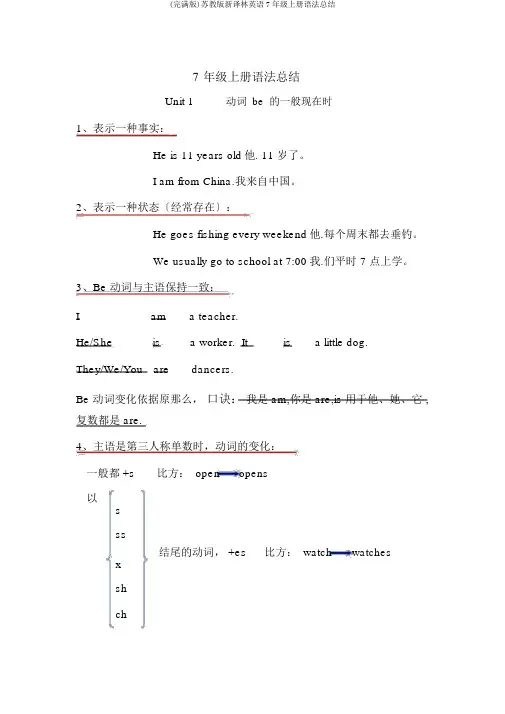
7年级上册语法总结Unit 1动词be的一般现在时1、表示一种事实:He is 11 years old他. 11 岁了。
I am from China.我来自中国。
2、表示一种状态〔经常存在〕:He goes fishing every weekend他.每个周末都去垂钓。
We usually go to school at 7:00我.们平时 7 点上学。
3、Be 动词与主语保持一致:I am a teacher.He/She is a worker. It is a little dog.They/We/You are dancers.Be 动词变化依据原那么,口诀:我是 am,你是 are,is 用于他、她、它 , 复数都是 are.4、主语是第三人称单数时,动词的变化:一般都 +s比方:open opens以sss结尾的动词, +es比方:watch watches xshch辅音字母 +y 结尾的动词, y ies比方:study studies④辅音字母 +o 结尾的动词, +es比方:go goes5、一般现在时的句型变换否认句 be+notShe is in the kitchen.~She is not in the kitchen.They are in the classroom.~Theyare not in the classroom.一般疑问句 be 提前She is in the kitchen.~Is she in the kitchen?—— Yes,she is.—— No,she isn’t.They are in the classroom.~Are they in the classroom?—— Yes,they are.—— No,they aren’t.Unit 2行为动词的一般现在时用法例句I go to school at 7:00 every morning.经常性、习惯性的动作The earth moves around the sun客观事实目前的爱好、能力等She sings very well.1、行为动词形式变化主语行为动词第一人称复数〔we〕/第二人称复原形数〔you〕/第三人称复数〔They〕例句We do our homeworkat home.You have lunch at school. They play basketball after school.第三人称单数〔 He、She、It 〕2、句型变换否认句: do+not/does +not 第三人称单She does her 数homework in theevening.You don’tgo to school on Sunday.He doesn’twork in this shop.句首增加 do/doesDo you play basketball after school?Does John speak Chinese?Unit 3人称代词1、我们常用人称代词表示人或物2、人称代词主格、宾格形式单数复数主格宾格主格宾格第一人称I Me We Us第二人称You You You YouHe Him They Them 第三人称She HerIt It3、主格在句中做主语,一般用在动词前宾格在句中做宾语,一般用在动词、介词后4、有好几个人称代词并列出现时,序次以下:单数: 231 原那么—— you、he and I复数: 123 原那么—— we、you and theyUnit 4表示时间的介词 in、on、at介词用法例子in一天中的早 /中/晚 In the morning/afternoon/evening月份In January/February/March/April季节In Spring/Summer/Autumn/Winter年份In 2021/2021on星期On Sunday/Monday/Tuesday某一天On 1 September某一天的早 /中/晚 On a cold morning/Sunday afternoon特定节日 /一天On Children’s Dayat某一时辰At 8:00年龄At 12 years old频度副词:always>usually>often>sometimes>seldom>neverUnit 5特别疑问句特别疑问词含义例句what什么What‘s your name?Class/grade哪个班级、年级What class/grade are you in? what colour什么颜色What colour do you like?time几点What time is it?when什么时候When do you usually get up? where哪里Where do you live?who谁Who is the man in a blue sweater?why为什么Why are you always late for school?whose谁的Whose pen is this?which哪一个Which is better,the red one or the blue one?how怎么样How do you go to school?many多少〔可数〕How many students are there in your class?much多少〔不能数〕How much milk do you drinkevery day?old几岁How old are you?how often多长时间一次How often do you go to the library?long多长How long is the Yangtze River?多久How long do you watch TVevery day?far多远How far is your home from school?tall多高How tall is the building?注意: when 和 what time 的差异What time 咨询的是详尽时间, when 能够是详尽时间也能够是大体时间。
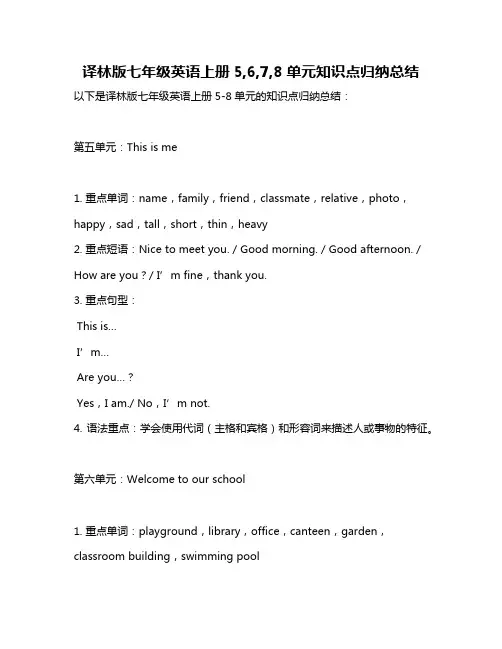
译林版七年级英语上册5,6,7,8单元知识点归纳总结以下是译林版七年级英语上册5-8单元的知识点归纳总结:第五单元:This is me1. 重点单词:name,family,friend,classmate,relative,photo,happy,sad,tall,short,thin,heavy2. 重点短语:Nice to meet you. / Good morning. / Good afternoon. / How are you?/ I’m fine,thank you.3. 重点句型:This is…I’m…Are you…?Yes,I am./ No,I’m not.4. 语法重点:学会使用代词(主格和宾格)和形容词来描述人或事物的特征。
第六单元:Welcome to our school1. 重点单词:playground,library,office,canteen,garden,classroom building,swimming pool2. 重点短语:in the playground/ library / office / canteen / garden / classroom building / swimming pool3. 重点句型:Where is the…?It’s on the…floor.Is there a…?Yes,there is./ No,there isn’t.4. 语法重点:学会使用介词(in,on)和情态动词(there is/ there are)描述场所和事物的位置。
第七单元:My day1. 重点单词:get up,have breakfast,go to school,have lunch,go home,have dinner,do homework,go to bed2. 重点短语:get up at…o’clock / have breakfast at…o’clock / go to school at…o’clock / have lunch at…o’clock / go home at…o’clock / have dinner at…o’clock / do homework at…o’clock / go to bed at…o’cloc k3. 重点句型:What time do you usually…?I usually…at…o’clock.4. 语法重点:学会使用时间介词(at)和时间副词(usually)描述日常活动的时间。
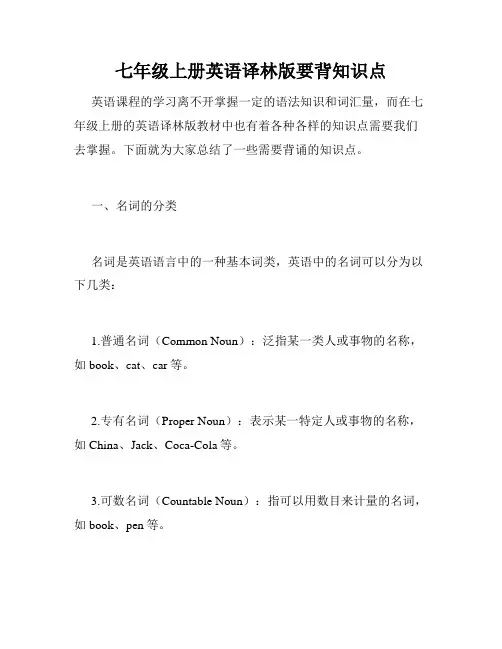
七年级上册英语译林版要背知识点英语课程的学习离不开掌握一定的语法知识和词汇量,而在七年级上册的英语译林版教材中也有着各种各样的知识点需要我们去掌握。
下面就为大家总结了一些需要背诵的知识点。
一、名词的分类名词是英语语言中的一种基本词类,英语中的名词可以分为以下几类:1.普通名词(Common Noun):泛指某一类人或事物的名称,如book、cat、car等。
2.专有名词(Proper Noun):表示某一特定人或事物的名称,如China、Jack、Coca-Cola等。
3.可数名词(Countable Noun):指可以用数目来计量的名词,如book、pen等。
4.不可数名词(Uncountable Noun):指不能用数目来计量的名词,如water、money等。
5.集合名词(Collective Noun):指一组人或物的名称,如class、team等。
6.抽象名词(Abstract Noun):指没有具体形体的名词,如love、happiness等。
二、英语时态英语中包含很多种不同的时态,常见的时态有以下几种:1.一般现在时(Simple Present Tense):表示现在正在发生的动作或状态,如I play basketball every Saturday。
2.一般过去时(Simple Past Tense):表示过去某个时间正在发生的动作或状态,如He went to Beijing last week。
3.现在进行时(Present Continuous Tense):表示正在进行的动作,如They are watching TV now。
4.过去进行时(Past Continuous Tense):表示在过去某个时间正在进行的动作,如I was studying at 8 o'clock last night。
5.一般将来时(Simple Future Tense):表示将来某个时间将要发生的动作或状态,如I will go to school tomorrow。
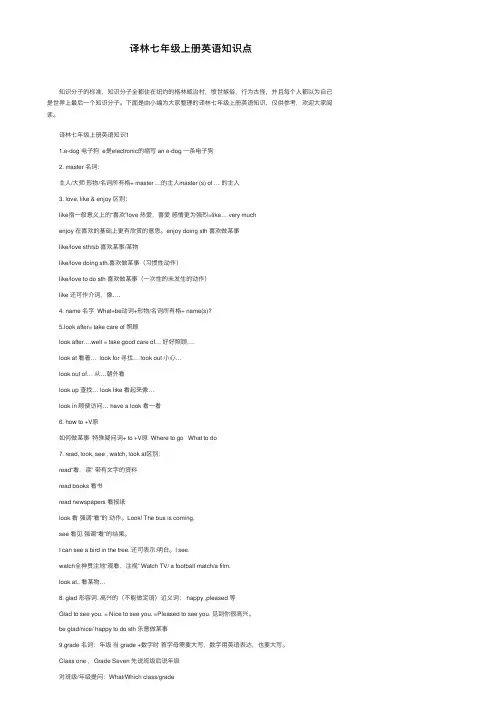
译林七年级上册英语知识点知识分⼦的标准,知识分⼦全都住在纽约的格林威治村,愤世嫉俗,⾏为古怪,并且每个⼈都以为⾃⼰是世界上最后⼀个知识分⼦。
下⾯是由⼩编为⼤家整理的译林七年级上册英语知识,仅供参考,欢迎⼤家阅读。
译林七年级上册英语知识11.e-dog 电⼦狗 e是electronic的缩写 an e-dog ⼀条电⼦狗2. master 名词:主⼈/⼤师形物/名词所有格+ master …的主⼈master (s) of … 的主⼈3. love, like & enjoy 区别:like指⼀般意义上的“喜欢”love 热爱,喜爱感情更为强烈=like… very muchenjoy 在喜欢的基础上更有欣赏的意思。
enjoy doing sth 喜欢做某事like/love sth/sb 喜欢某事/某物like/love doing sth.喜欢做某事(习惯性动作)like/love to do sth 喜欢做某事(⼀次性的未发⽣的动作)like 还可作介词,像….4. name 名字 What+be动词+形物/名词所有格+ name(s)?5.look after= take care of 照顾look after….well = take good care of… 好好照顾….look at 看着… look for 寻找… look out ⼩⼼…look out of… 从…朝外看look up 查找… look like 看起来像…look in 顺便访问… have a look 看⼀看6. how to +V原如何做某事特殊疑问词+ to +V原 Where to go What to do7. read, look, see , watch, look at区别:read“看,读” 带有⽂字的资料read books 看书read newspapers 看报纸look 看强调“看”的动作。
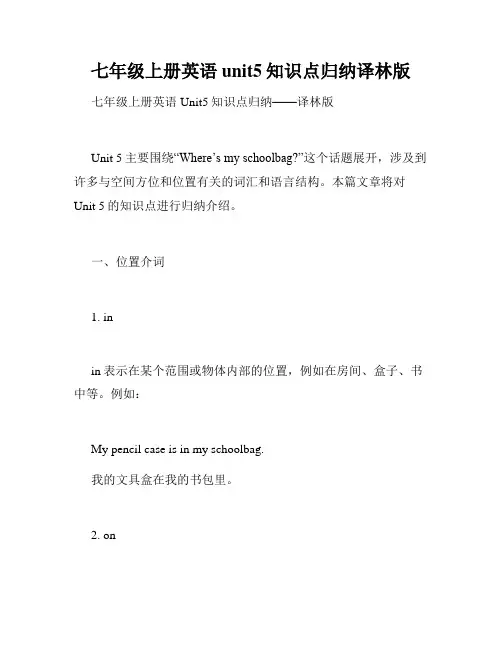
七年级上册英语unit5知识点归纳译林版七年级上册英语Unit5知识点归纳——译林版Unit 5主要围绕“Where’s my schoolbag?”这个话题展开,涉及到许多与空间方位和位置有关的词汇和语言结构。
本篇文章将对Unit 5的知识点进行归纳介绍。
一、位置介词1. inin表示在某个范围或物体内部的位置,例如在房间、盒子、书中等。
例如:My pencil case is in my schoolbag.我的文具盒在我的书包里。
2. onon表示在物体表面位置,例如在桌子、椅子、书本上等。
例如:My water bottle is on the desk.我的水瓶放在桌子上。
3. underunder表示在物体下面,例如在椅子、床、桌子下面等。
例如:My school shoes are under the bed.我的校鞋在床下。
4. behindbehind表示在某个物体的后面,例如在门、椅子、书柜后面等。
例如:My backpack is behind the door.我的背包在门后面。
5. in front ofin front of表示在某个物体的前面,例如在门、窗户、电视机前面等。
例如:My computer is in front of the window.我的电脑在窗户前面。
二、位置疑问词1. wherewhere表示“哪里”,用于询问事物所处的位置。
例如:Where is my pencil?我的铅笔在哪里?2. therethere表示“那里”,用于指示事物所处的位置。
例如:There is a cat under the table.桌子下面有只猫。
三、被动语态被动语态表示动作发生的被动状态,即动作的承受者是主语。
在本单元中,被动语态主要用于表达物品的丢失。
例如:My schoolbag was lost.我的书包丢了。
四、情态动词can情态动词can表示“能够”,用于表示能力或者允许做某事。
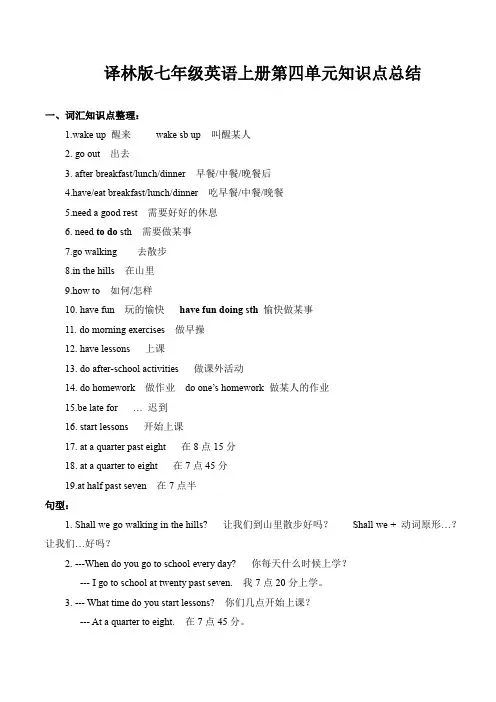
译林版七年级英语上册第四单元知识点总结一、词汇知识点整理:1.wake up 醒来wake sb up 叫醒某人2. go out 出去3. after breakfast/lunch/dinner 早餐/中餐/晚餐后4.have/eat breakfast/lunch/dinner 吃早餐/中餐/晚餐5.need a good rest 需要好好的休息6. need to do sth 需要做某事7.go walking 去散步8.in the hills 在山里9.how to 如何/怎样10. have fun 玩的愉快have fun doing sth愉快做某事11. do morning exercises 做早操12. have lessons 上课13. do after-school activities 做课外活动14. do homework 做作业do one’s homework 做某人的作业15.be late for … 迟到16. start lessons 开始上课17. at a quarter past eight 在8点15分18. at a quarter to eight 在7点45分19.at half past seven 在7点半句型:1. Shall we go walking in the hills? 让我们到山里散步好吗?Shall we + 动词原形…?让我们…好吗?2. ---When do you go to school every day? 你每天什么时候上学?--- I go to school at twenty past seven. 我7点20分上学。
3. --- What time do you start lessons? 你们几点开始上课?--- At a quarter to eight. 在7点45分。
时间的表达:1.顺读法:7:20 seven twenty 8:30 eight thirty 9:15 nine fifteen2.逆读法:当分钟>30时(60-分钟)to (小时+1)表示几点差几分如:7:40 twenty to eight 8:45 a quarter to nine当分钟≤30时分钟past 小时表示几点过几分如:9:10 ten past nine 7:30 half past seven 8:15 a quarter past eightReading短语:1.from Monday to Friday 从星期一到星期五2.be good at doing sth 擅长做某事3.a lot of= lots of + 可数名词/不可数名词许多many + 可数名词复数许多much+不可数名词许多4.be nice/kind/friendly to sb 对某人友好5.chat with sb 和某人聊天chat→cha tt ing6.each other 相互7.or 或者;否则8.in the playground 在操场9.my friends and I 我和我的朋友(注意I放在and后)10.on Tuesday 在星期二(星期前用on)11.in the school volleyball team 在学校排球队12.practise doing sth 练习做某事13.have a good time 玩得愉快14.Best wishes 美好的祝愿15.read books 看书句型:1.Our school starts at eight in the morning from Monday to Friday.我们的学校生活是从星期一到星期五早上8点开始。
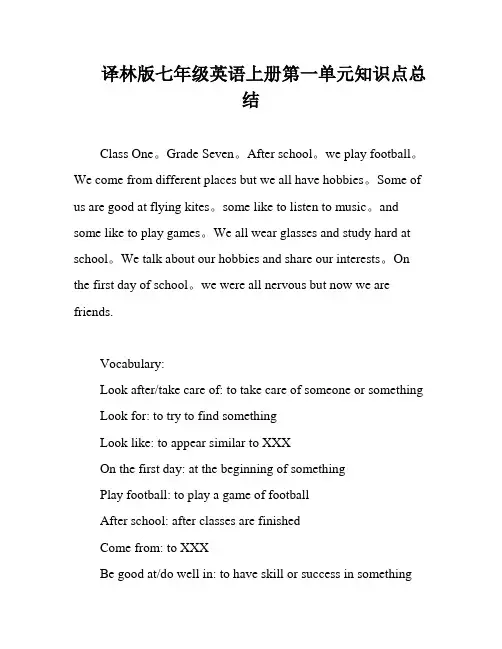
译林版七年级英语上册第一单元知识点总结Class One。
Grade Seven。
After school。
we play football。
We come from different places but we all have hobbies。
Some of us are good at flying kites。
some like to listen to music。
and some like to play games。
We all wear glasses and study hard at school。
We talk about our hobbies and share our interests。
On the first day of school。
we were all nervous but now we are friends.Vocabulary:Look after/take care of: to take care of someone or something Look for: to try to find somethingLook like: to appear similar to XXXOn the first day: at the beginning of somethingPlay football: to play a game of footballAfter school: after classes are finishedCome from: to XXXBe good at/do well in: to have skill or success in somethingFly XXX: to fly a kite in the airGo home: to return to one's homeListen to music: to hear and enjoy musicPlay a game: to participate in a gameWear glasses: to have glasses on one's faceAt school: at the place where one studiesAll the lessons: all the classes or subjectsTalk about: XXXOver there: at a distance from hereA lot of hobbies: many different interestsStructure:Love/like doing something: to enjoy doing somethingLet's + verb: a n to do something togetherI am/My name is: introducing oneselfe to + place: a greeting when XXXThis is: XXXBe good at/do well in doing something: to have skill or success in somethingIn Class。
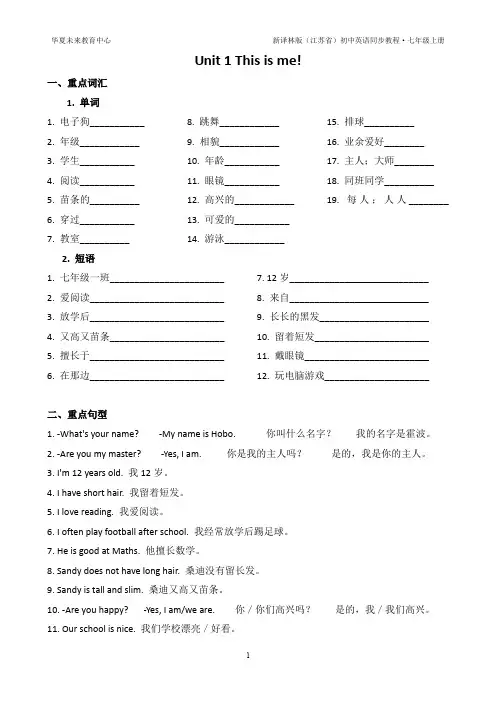
Unit 1 This is me!一、重点词汇1. 单词1. 电子狗___________2. 年级____________3. 学生___________4. 阅读___________5. 苗条的__________6. 穿过___________7. 教室__________ 8. 跳舞____________9. 相貌____________10. 年龄___________11. 眼镜___________12. 高兴的____________13. 可爱的___________14. 游泳____________15. 排球__________16. 业余爱好________17. 主人;大师________18. 同班同学__________19. 每人;人人________2. 短语1. 七年级一班_______________________2. 爱阅读___________________________3. 放学后___________________________4. 又高又苗条_______________________5. 擅长于___________________________6. 在那边___________________________7. 12岁____________________________8. 来自____________________________9. 长长的黑发______________________10. 留着短发_______________________11. 戴眼镜_________________________12. 玩电脑游戏_____________________二、重点句型1. -What's your name? -My name is Hobo. 你叫什么名字?我的名字是霍波。
2. -Are you my master? -Yes, I am. 你是我的主人吗?是的,我是你的主人。
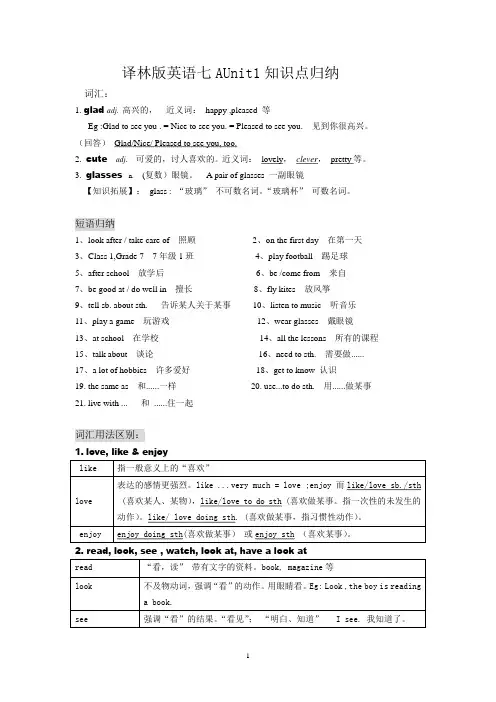
译林版英语七AUnit1知识点归纳词汇:1. glad adj. 高兴的,近义词:happy ,pleased 等Eg :Glad to see you . = Nice to see you. = Pleased to see you. 见到你很高兴。
(回答)Glad/Nice/ Pleased to see you, too.2. cute adj. 可爱的,讨人喜欢的。
近义词:lovely,clever,pretty等。
3. glasses n.(复数)眼镜。
A pair of glasses 一副眼镜【知识拓展】:glass : “玻璃”不可数名词。
“玻璃杯”可数名词。
短语归纳1、look after / take care of 照顾2、on the first day 在第一天3、Class 1,Grade 7 7年级1班4、play football 踢足球5、after school 放学后6、be /come from 来自7、be good at / do well in 擅长8、fly kites 放风筝9、tell sb. about sth. 告诉某人关于某事10、listen to music 听音乐11、play a game 玩游戏12、wear glasses 戴眼镜13、at school 在学校14、all the lessons 所有的课程15、talk about 谈论16、need to sth. 需要做...... 17、a lot of hobbies 许多爱好18、get to know 认识19. the same as 和......一样20. use...to do sth. 用......做某事21. live with ... 和......住一起词汇用法区别:1.love, like & enjoy2. read, look, see , watch, look at, have a look at本单元应该掌握的句子:1.What’s your name?你叫什么名字?2.Nice to meet you! 很高兴见到你。
牛津译林版七年级上册英语Unit1语法总结1. 一般现在时一般现在时表示经常性、惯性或普遍性的动作或状态。
其构成为:主语 + 动词原形 (+ 其他补充成分)。
例句:- I play basketball every day.(我每天打篮球。
)- She likes reading books.(她喜欢读书。
)2. 句型:主语 + be + 形容词这种句型用来表达主语的状态或特征。
例句:- The weather is sunny today.(今天天气阳光明媚。
)- He is tall and handsome.(他又高又帅。
)3. 一般过去时一般过去时用来表示过去某个时间发生的动作或存在的状态。
其构成为:主语 + 动词过去式 (+ 其他补充成分)。
例句:- They went to the park yesterday.(他们昨天去了公园。
)- We lived in Shanghai five years ago.(我们五年前住在上海。
)4. 句型:主语 + be + 动词-ing这种句型用来表示主语正在进行的动作。
例句:- I am studying English now.(我现在正在研究英语。
)- They were playing soccer in the park yesterday.(他们昨天在公园踢足球。
)5. 一般将来时一般将来时用来表示将来某个时间将要发生的动作或存在的状态。
其构成为:主语 + will + 动词原形 (+ 其他补充成分)。
例句:- We will have a party next week.(下周我们将举行一个派对。
)- She will visit her grandparents tomorrow.(她明天将去看望她的祖父母。
)6. 句型:主语 + be + going to + 动词原形这种句型用来表示主语打算或计划将要发生的动作。
例句:- I am going to meet my friends this afternoon.(今天下午我将去见我的朋友。
七年级上册英语第三单元知识点总结译林版以下是七年级上册英语第三单元的知识点总结(译林版):一、重点单词和短语:1. hello/hi 你好(用于问候、打招呼)2. goodbye/bye-bye 再见(用于告别)3. this 这个4. that 那个5. these 这些6. those 那些7. my 我的8. your 你的9. his 他的10. her 她的11. our 我们的12. their 他们的13. a/an 一个(用于可数名词前)14. book 书15. bag 书包16. pen 钢笔17. ruler 尺子18. pencil box 铅笔盒19. apple 苹果20. dictionary 词典21. what 什么22. in 在……里面23. their 他们的(反身代词)24. key 钥匙25. please 请26. thank you 谢谢你27. can 能够,可以(情态动词)28. spell 用字母拼写(动词)29. a set of 一套(量词)30. cup 杯子(可数名词)31. cupboard 碗柜(不可数名词)32. newspaper 报纸(不可数名词)33. football 足球(不可数名词)34. basketball 篮球(不可数名词)35. tennis racket 网球拍(不可数名词)36. tomato 西红柿(可数名词)37. carrot 胡萝卜(可数名词)38. pie 馅饼(不可数名词)39. spoon 匙(可数名词)40. plate 盘子(可数名词)41. fork 叉子(可数名词)42. knife 刀子(可数名词)43. egg 鸡蛋(可数名词)44. fork and knife 叉子和刀子(复数形式)45. spoon and fork 匙和叉子(复数形式)46. knife and fork 刀子和叉子(复数形式)47. raspberry 覆盆子(可数名词)48. grape 葡萄(可数名词)49. have 吃,喝(动词)50. like 喜欢(动词)51. want 想要(动词)52. taste 尝起来(动词)53. sweet 甜的(形容词)54. sour 酸的(形容词)55. fresh 新鲜的(形容词)56. healthy 健康的(形容词)57. delicious 美味的(形容词)58. hot 热的(形容词)59. cold 冷的(形容词)60. have a look 看一看(固定短语)。
七年级上册英语译林版u6知识点总结归纳Unit 6: Travelling Around本单元主要介绍了旅行和出行的相关词汇和表达方式,以及一些国家和城市的专有名词。
1. Words and Phrases(单词和短语)1) Means of transportation:交通方式- by bus/train/car/plane/ship- take a bus/train/car/plane/ship2) Places to visit:游览的地方- museum/market/park/zoo- historical sites/scenic spots3) Accommodation:住宿- hotel/hostel/guesthouse- book/reserve a room4) Directions:方向- go straight/ahead/turn left/right- at the corner/traffic lights5) Preferences:偏好- like/love/enjoy- prefer/would rather- dislike/hate6) Weather:天气- sunny/cloudy/rainy/windy- hot/warm/cold/cool7) Time:时间- morning/afternoon/evening- today/tomorrow/yesterday2. Sentences(句子)1) Asking for and giving directions:寻求和给予方向- Excuse me, could you tell me the way to the nearest hospital? - Sure, go straight, and you'll see it on your left.2) Making travel plans:制定旅行计划- I'm planning to visit Beijing next month.- That sounds great! You should visit the Great Wall.3) Describing preferences and opinions:描述偏好和观点- I prefer walking to taking the bus.- I think Chinese food is delicious.4) Talking about the weather:谈论天气- What's the weather like today?- It's sunny and warm.5) Asking for and giving suggestions:寻求和给予建议- Where should I go for a vacation?- I recommend visiting Paris. It's a beautiful city.3. Nationalities and Countries(国籍和国家)1) Nationalities(国籍)- Chinese/American/French/Australian2) Countries(国家)- China/America/France/Australia4. Cities and Landmarks(城市和名胜)1) Cities(城市)- Beijing/Shanghai/Tokyo/Paris2) Landmarks(名胜)- the Great Wall/the Eiffel Tower/the Sydney Opera House 总结(Conclusion):本单元学习了旅行和出行的相关词汇和表达方式,如交通方式、游览的地方、住宿、方向、偏好、天气和时间等。
7A Unit 1 知识点整理1.love/like sb./sth. 喜欢某人/某物love/like to do sth. 喜欢做某事(一时喜欢,常指一个具体的动作) love/like doing sth. 喜欢做某事(一直喜欢,可以指兴趣爱好)●I like watching films. I like Liu Dehua and his films. But don’t like to watch a film with my friend this afternoon.2.edogs(复数)/an edog(单数) 一只电子狗●edog/'i:dɒg/ 音标最前面是元音音素,所以用an3.What’s your name? My name is...你叫什么名字?我的名字是......What’s his/ her name? His/Her name is...他/她叫什么名字?他/她的名字是......●what’s=what is 看名词name,name单数用is,names复数用are4.in Class One, Grade Seven 在七年级一班●先班级后年级都大写5.read this book读这本书●My grandfather likes reading books and newspapers.6.look after =take care of 照顾I often look after my little sister.=I often take care of my little sister.●I often look after her well.=I often take good care of her.7.how to do sth. 如何做某事●I don’t know how to learn English well.8.Good morning / afternoon / evening. 早上/下午/晚上好。
新译林版七年级上册英语全册知识点归纳总结Unit one一、词汇知识点整理:look after \ take care of 照顾 ;表示look 的短语:look after照顾look at 看…; look for 寻找look like 看起来像… on the first day 在第一天Class One, Grade Seven (先说班级,再说年级,且大写)。
play football 踢足球 after school 放学后be\come from 来自be good at \do well in 擅长fly kites 放风筝go home 回家listen to music 听音乐play a game 玩游戏wear glasses 戴眼镜at school 在学校all the lessons 所有的课程 talk about 谈论over there 那里 a lot of hobbies 许多爱好二、结构用法:love\like doing sth 喜欢做某事let’s +动词原形让我们I am\My name is 我叫welcome to +地点欢迎来到This is 这是be good at \do well in doing 擅长做in Class…Grade…在几年级几班be from = come from + 地点, 意思是“来自某地”。
He is from Nanjing. P8 他来自南京。
live with…in…和谁住在哪里live with sb 和某人住一起;live in+ 城市名,住在某地;live on the ground floor 住在一楼(用介词on)I’m…year old. 我几岁了。
year(s) old ,……岁,如果数词大于1,year 要用复数years. 问年龄要用How old “几岁”提问。
例如:- is your sister? --- She is 11. 应填How old.I have (short/long)hair.我留着短(长)头发三、句式用法What’s your name?你叫什么名字?Nice to meet you! 很高兴见到你。
I love reading. 我喜欢阅读英语.表示“喜欢”的用法:like喜欢/love喜爱/enjoy喜欢+ V.-ing 形式。
Now let’s meet our new classmates. 现在让我们认识下我们的新同学。
I often play football after school.放学后我经常踢足球。
She is tall and slim. 她个头很高,身材苗条。
He is from Nanjing. 他来自南京。
He comes from Nanjing.He is good at Maths. 他擅长于数学。
He does well in Maths.Millie is 11 years old.米莉11岁。
They are all very nice.他们都很好。
I am good at dancing. 我擅长于跳舞。
四、语法归纳:连系动词be 的一般现在时动词be 的三变化 am is are.我(I)用am ,你(you)用are ,is 用于他(he)她(she)它(it),单数名词用is,复数名词都用are句型结构:1、肯定句:主语+am\is\are … It is a football.2、否定句:主语+am\is\are+not… It is not a football.3、一般疑问句:Am\Is\Are+主语+其他? Is it a football? 回答 Yes, it is. No, it isn’t4、特殊疑问句:疑问句+am/is/are +主语+其他?What’s your name?语法小练习:用be 动词的适当形式填空1、She ___________ my cousin. Her name __________ Li Jie.2、Tom and I ___________ good friends3、What ________ this in English? It _________ a book4、___________ you Jack? Yes, I __________5、What ___________ those? They _________ his notebooks.Unit two一、词汇知识点整理:play sports 做运动many times a day 一天许多次play football/tennis 踢足球/打网球 talk about 谈论after school 放学后go swimming 去游泳a member of …中的一员 come from 来自listen to music 听音乐 in the next World Cup 在下届世界杯come true 实现 in one’s free time 在某人的空闲时间live in 住/生活在read books 看书at/ on weekends=at/on the weekend在周末stay at home 待在家里 a lot of 许多ask sb about sth 问某人某事on TV 在电视上Watch basketball matches 看篮球比赛 feel great 感觉特棒二、结构用法:What about doing sth ?做…怎么样?Enjoy doing sth 喜欢做某事make sb/sth +adj 使某人/某物make sb to do sth 使某人做某事want to do sth 想要做某事hope to do sth 希望做某事have fun doing sth 做某事开心三、句式用法I like walking. 我喜欢散步。
I enjoy swimming.What’s your favourite sport?我喜欢游泳,他最喜欢的运动是什么?I hope his dream comes true. 我希望他梦想成真。
What does Li Hua do in his free time? 李华在业余时间做什么?What else do you want to do? 你还想做什么其他的事情?Reading is fun. 读书是有趣的事情。
四、语法归纳:行为动词的一般现在时行为动词的一般现在时的构成:主语+行为动词+(其他)当主语为第三人称单数(he, she, it)时,谓语动词也要用单数形式。
用好一般现在时,时间状态需牢记; 主语人称是三单,动词要把-s/-es 添;基本用法要记清,状态习惯经常性。
行为动词的一般现在时的变化1. 否定句:主语+ don’t/doesn’t + 动词原形+其他I don’t like bread.He doesn’t often play football.2. 一般疑问句:Do/Does + 主语+动词原形+其他Do you often play football? Yes, I am /No, I am notDoes he often play football? Yes, he does/ No, he doesn’t3、特殊疑问句:特殊疑问句+一般疑问句?When do you go to school? I go to school at seven o’clock.动词的三单形式的变化:动词三单现在时,一般在词尾加S S,x,ch,sh,在词尾,直接加上-es词尾若是字母o ,加上-es 不用愁。
词尾是“辅音字母+y” ,先变y为i, 后边再加-es语法小练习:用括号内动词的适当形式填空。
1. He often ________(have) dinner at home.2. Daniel and Tommy _______(be) in Class One.3. We _______(not watch) TV on Monday.4. Nick _______(not go) to the zoo on Sunday.5. ______ they ________(like) the World Cup?6. What _______they often _______(do) on Saturdays?7. _______ your parents _______(read) newspapers every day?8. The girl _______(teach) us English on Sundays.9. She and I ________(take) a walk together every evening.10. There ________(be) some water in the bottle.11. Mike _______(like) cooking.12. They _______(have) the same hobby.13. My aunt _______(look) after her baby carefully.14. You always _______(do) your homework well.15. She _______(go) to school from Monday to Friday.16. The child often _______(watch) TV in the evening.17. How many lessons _________ your classmate _________ (have) on Monday?18.What time _________ his mother _________ (do) the housework?Unit 3一、词汇知识点整理:on foot 步行 far away from 远离a few 一些,少量 learn about 学得,获知would like sth/to do sth 想要/想要做某事after class 下课后on this day 在今天all kinds of 各种各样on the phone 在电话中look at 看ground floor 底层,一楼on the wall 在墙上 by bus 乘公共汽车in front of 在……前面 let me see 让我看看go to school 去上学reading room 阅览室borrow from 从……借……get to school 到达学校on the Open Day 在开放日二、结构用法:Thank you for doing sth 为做某事而感谢你be ready to do sth 准备做某事It takes sb some time to do sth 花费某人多少时间做某事show sb around 领某人参观need to do sth 需要做某事三、句式用法:1.Which of the subjects do you like best, Eddie? P30 Eddie,(在所有科目中,你最喜欢哪一科?subjects 是复数。